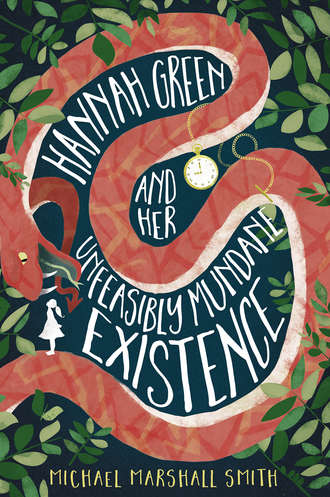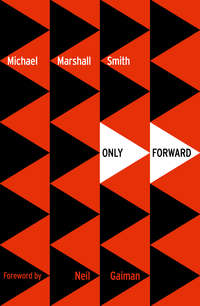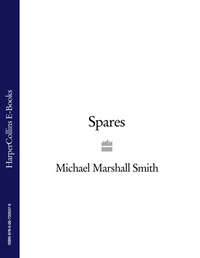
Полная версия
Hannah Green and Her Unfeasibly Mundane Existence
And we will.
But before we get any further into Hannah’s story, we need to go and meet someone else.
Chapter 2
Because, meanwhile, an old man was dozing on the terrace of the Palace Hotel, on Miami’s South Beach.
The hotel stands amidst a half-mile of art deco jewels restored to their former glory in the 1980s, and – like many of the others – was determinedly now running back to seed, as though that was the state in which it felt most comfortable. The old man had a local newspaper on his lap but he had not read it. To one side, on the table supporting the umbrella protecting him from the sun, was a glass of ice tea that had long ago come up to ambient temperature. A large bug was swimming in it, a leisurely freestyle. The waiter working the terrace had approached the table several times to see if the gaunt old buzzard wanted his glass refreshed. Each time he’d discovered the man’s eyes were closed. His position had not changed in quite a while.
Nonetheless the waiter decided to try one more time. In half an hour his shift would be over. In most ways that was awesome. The afternoon had been hellishly humid and the waiter was looking forward to returning to his ratty apartment, taking a shower, sitting out on his balcony and smoking pot for a couple of hours before hitting the town in the hope of finding some margarita-addled divorcée or, failing that, simply getting wasted. Business on the terrace had not been brisk, however. He was below quota on tips (and behind on his rent), and that was why he decided – now it was approaching five – it was worth one final attempt to upsell the old dude in the crumpled suit into a big glass of wine or, better still, an overpriced cocktail.
He went and stood over him.
The old man’s head was tilted forwards in sleep, showcasing a pale forehead dotted with liver spots, a sizable beak of a nose, and combed-back hair that, though pure white, remained in decent supply. Large, mottled hands rested on knees that appeared bony even through the black linen of his suit. Who wore black in Florida, for God’s sake?
The waiter coughed. There was no response.
He coughed again, more loudly.
Consciousness returned slowly.
It felt as though it was coming from a great distance, and that was because this was not a normal awakening. It wasn’t merely a matter of rising from sleep. On this day, the old man woke from a far deeper slumber.
He opened his eyes and for a moment he had no idea where he was. It was hot. It was bright, though the quality of the light suggested it must be towards the end of the afternoon. He could see the glint of some ocean or other, past the stone terrace on which he sat.
And there was a young man, wearing a white apron, standing in front of him and smiling the kind of smile that always had financial outlay attached to it.
‘Refreshed, sir?’
The old man stared confusedly at him for a moment, and then sat up straight. He peered around the terrace and saw young couples at other tables, and a few older people wearing hats and looking out at the ocean as if waiting for it to do something. Hotels on either side. Palm trees.
He turned back to the waiter. ‘Where am I?’
The waiter sighed. The old fart had seemed fine when he ordered his ice tea earlier. Evidently a day in the sun had fried what was left of his wits.
‘Wondered if I could interest you in a cold glass of Chardonnay, sir? We have an intriguing selection. Though perhaps a crisp Sauvignon Blanc would be more to your taste? Or a Martini, a Bellini, or a Sobotini? That’s the signature creation of our in-house executive mixologist, Ralph Sobo, and features a trio of—’
‘Did I ask you to recite the entire drinks menu?’
‘No, sir.’
‘So?’
The waiter smiled tightly. ‘You are on the terrace of the Palace Hotel,’ he said, offensively slowly. ‘South Beach. Miami. The United States of America.’ He leaned forwards and added, loudly enough for people nearby to turn and smile to themselves, ‘Planet Earth.’
The man frowned. ‘How long have I been here?’
‘In this spot? The entire afternoon. The hotel? I have no clue. I’m sure reception can assist you with that information, along with your name, if that’s also slipped your mind. Now – can I help you with a beverage, or not?’
The man shook his head. ‘Just my bill.’
The waiter walked off, bouncing his tray against his knee, vowing that he would use everything within his power to make sure that the wrinkly old fool received his bill only after a very significant delay.
This waiter had only been working at the Palace for a couple of days, and didn’t yet know many other members of staff. Otherwise he might have heard, in passing, whispers about this particular old man. Rumours that in the three months he’d been resident in a suite on the thirteenth floor, it had proved impossible to place guests in the accommodation on either side. The hotel’s sophisticated computer system appeared to have developed an intermittent glitch that meant those rooms showed up as occupied, even when they were not. Any attempt to override or ignore this resulted in double- or even treble-booking, with the inevitable fallout of enraged guests, and so for the time being reception had stopped trying to allot the rooms. They had also temporarily halted attempts to get to the bottom of the means of payment the old man had presented. His credit card, though unimpeachable in status and hue, proved impossible to retain reliably in the system. As a result – and to the hotel manager’s increasing disquiet – no charge had yet been levied against it. The technical department claimed this would be fixed very soon. The manager hoped this was true, though it was not the first or even third time he’d been given this assurance.
The waiter didn’t know any of this, however. So he went over to the register and surreptitiously tore up the old man’s bill, before hanging up his apron and leaving the terrace, whistling a tune to himself.
It’d only take the senile old bastard ten or fifteen minutes to get a new bill from the next waiter, but any inconvenience was better than none.
The man sitting under the umbrella didn’t wait that long, however. He laid ten dollars on the table, securing it under his glass. He stood. For a few moments he didn’t move any farther, apparently becalmed, his face blank.
Then suddenly he smiled.
It was not a simple smile, one of pleasure or joy. It was complicated, rueful. If you’d been watching, you might have thought he’d remembered something, a matter that was not urgent but which he felt foolish for having neglected.
He took a last look at the ocean and then turned and walked towards the doors to the hotel lobby, moving with a good deal more grace and speed than you might have expected.
An hour later, after a shower and in the middle of his second joint, the waiter from the Palace Hotel was relaxing on his balcony when it suddenly collapsed, dropping him forty feet into the chaos of his downstairs neighbour’s scrap of yard, where he died, reasonably quickly, as a result of a sheared metal strut which punctured his ribcage and heart.
This was not a coincidence.
Chapter 3
It was seven in the evening, and Hannah was waiting.
Waiting.
Waiting.
She’d been waiting since breakfast, during which her father had been even more distant and insubstantial than usual; and waiting since he’d dropped her at school, saying goodbye with a hug and a kiss but an odd look in his eyes. He had forgotten to shave that morning, she noticed. He’d forgotten the day before, too. She hadn’t waited during the math homework they’d endured after pick-up, as she knew she had to pay attention. Her dad had more than once described helping her with math as his punishment for all the evil things he didn’t remember doing in a previous life, or lives, and while she doubted this was true she understood his patience was not limitless, especially now.
She then waited while he cooked dinner, her favourite, a creamy pasta dish with bacon and peas that he’d invented for her when she was small and the very smell of which made her feel safe and warm even when she knew that the world had changed. In fact, as she sat in the corner of the kitchen reading while he cooked, she wondered whether it was accidental that he happened to be cooking creamy bacon pasta this evening, or if it was in some way related to whatever it was that she knew – without having any reason she could put a finger on – that she was waiting for. The menu had been notably random in recent weeks, occasionally featuring complicated things she’d never seen before, but then frozen pizza three nights in a row.
And now tonight, suddenly, it was her favourite.
Waiting.
They ate at the kitchen table. Her father asked about her day, and listened, seeming more ‘there’ than for the last day or two. He didn’t eat much, though.
Afterwards Hannah carried her plate to the dishwasher and went to the living room to wait some more. Finally her father came through holding a cup of coffee. He perched on the edge of the sofa. ‘I need to say something,’ he said.
For a dire moment, Hannah was convinced he was going to tell her that Mom was never coming back from London, or that Hannah had to leave too, or he’d decided they needed to move to another town or something. She stared at him, barely able to breathe, but saw that his eyes looked soft, and so she thought probably – hopefully – it wasn’t something as bad as that.
‘What?’ she asked.
He pursed his lips and stared down at the carpet. He looked tired. Some of his bristles were grey. Had they been that way before Mom left? Hannah wasn’t sure. He’d never forgotten to shave when Mom was around.
‘I’m not handling this as well as I’d like,’ he said. ‘Your mom being … not here, I mean. I’m trying to do what needs to be done. And it’s working, right? We’re doing OK?’
Hannah nodded dutifully. Most of the time it sort of was OK, but even if it hadn’t been, she understood he hadn’t asked the question in order for her to answer it. Grown-ups did that a lot, saying something they believed to be a fact but putting a question mark at the end. It was meant to make you take the fact more seriously, or something. You learned that you weren’t expected to say anything in reply, just as you learned that if you were a girl you didn’t always want to mention your video-game scores to boys, especially if yours were higher.
‘But …’ He stopped. He didn’t seem to know what he wanted to say next.
‘You’re sad,’ she said.
He laughed, surprised. ‘Well, yeah. You are too, I know. It’s, uh, it’s a strange time.’
‘I’m sad,’ she agreed. ‘But not like you are.’
‘What … do you mean?’
‘You’re badly sad.’
He stared at her, nodding, and she was intensely scared to see that his eyes were full. She had never, ever seen her dad cry. She didn’t want to see it now. She knew life sucked but if it turned out it was bad enough to make her father cry, it was far worse than she realized. That would be beyond mundane.
‘Did I say something wrong?’
‘No. You said something smart.’ He sniffed briskly, and stopped looking like he was going to cry. ‘I need some time,’ he said. ‘Firstly … well, all this.’ He raised his hands, referring to the house, and what was in it, and what was not in it any more. ‘Plus … work. I’m getting behind. One or the other thing, I could handle. Both at once, not so much. It seems.’
Hannah understood that her father typed for a living, for people who lived down in Los Angeles, helping them make stories. She knew this was a hard job sometimes, partly because – so she had gathered, from overhearing conversations between him and Mom – almost all of the people her dad worked for were assholes and idiots, with the creative acumen of mosquitoes and the moral sensibilities of wolverines. He said things like this very quietly, though, as if concerned they might be able to hear him from over three hundred miles away.
‘OK, look,’ he said. ‘Here’s the thing. I wondered if you’d like to go stay with Granddad for a while.’
Hannah wanted to say ‘yes’ immediately, but dimly understood that she should not. ‘Granddad?’
Her father was watching her carefully. ‘Yes.’
‘Why not Aunt Zo?’
‘Zo-zo’s busy.’ He sighed. ‘Got an exhibition coming up, or a performance, or some … thing. Plus you’ve seen her apartment. She has to stand up when she goes to sleep.’
This was an old family joke and Hannah smiled as always, or tried to. It felt different now. In the past there would never have been any question of her staying with Aunt Zo. Now it had evidently been considered, and rejected. That made Hannah feel rejected too. ‘And I was thinking … of you going for more than a couple of days.’
‘How long?’
‘A week. Maybe two.’
Two whole weeks? ‘When?’
‘Tomorrow.’
‘But … what about school?’
‘I talked to Teacher Jen. She said it would be OK.’
Hannah looked hard at her father, and knew he was not telling the truth. Not the whole truth, anyway. He would have talked to her teacher, yes. You couldn’t just yank a kid out of school without clearing it with mission control.
But it struck her now that, though he had not shaved, he’d been wearing smart chinos and a shirt when he dropped her at school that morning – the first time in ages he hadn’t been wearing the raggedy jeans he used to only wear at the weekend. She didn’t think you could bail your kid out of school for two weeks just by saying ‘I’m having a hard time.’ So probably he’d said it was something to do with working for the wolverines instead, which is why he’d been wearing business clothes. Things to do with work were always incredibly important for grown-ups. They were respected without question. Far more, it sometimes seemed, than things to do with children.
‘Have you asked Granddad?’
‘Yes. I spoke to him last night. Well, emailed. There’s no phone signal there.’
‘Where is he now? Where on earth?’
Her father smiled, and this time it looked genuine. It made Hannah realize what a long time it had been since she’d seen that kind of smile on his face.
‘Washington State,’ he said, as if this meant the far side of the moon. ‘God knows why. But where he’s staying sounds pretty cool. I think you’ll like it. And he says he’s really looking forward to seeing you.’
From the moment Dad first mentioned the idea, Hannah had wanted to go. She loved her dad’s dad, and the prospect of getting out of Santa Cruz for a while, doing something – anything – other than plodding through her mundane existence, felt desperately attractive. She’d held back from leaping at it because she knew she shouldn’t seem as if she wanted to get away from her father. That also meant she had to say what she said next. ‘But I’ll miss you.’
As soon as the words were out of her mouth, she realized how true they were. How badly true.
Her dad’s lips clamped together, the way they sometimes did when he was mad. His eyes didn’t look mad, though. Not at all.
‘I’ll miss you too,’ he said. ‘But we can Skype, and email, and it’s not so long. And when you get back, things will be better here. I promise.’
‘OK,’ Hannah said. ‘Can I watch some Netflix now?’
‘Sure,’ he said, wrong-footed.
‘Yay.’
She jumped up and ran to the den and switched on the big TV. As she was waiting for her show to load she glanced back into the living room and saw that her father was still sitting on the edge of the sofa, shoulders bowed and head lowered. She could not see his face or eyes.
His shoulders seemed to shake, for a moment, and then shake again. Presumably he was laughing at something.
Chapter 4
The driver pulled over to the side of Ali Baba Avenue and turned to look at the guy in the back of his cab.
‘You sure this is where you want to be?’
The old man had been silent throughout the long journey into Dade County from South Beach, successfully resisting Domingo’s attempts to involve him in conversation. Domingo was good at conversation, too. His game was tight. He didn’t mind listening either, a much rarer gift, and so he could usually get customers to chat with him, and he did this out of a simple desire to tell people things and to hear stuff about where they’d come from and where they were going, not just because it meant a bigger tip, though that was always welcome.
This customer, though … he wasn’t buying it. Anything Domingo said, he’d said nothing back, remaining relentlessly and noisily silent. He was currently looking out of the window at the twilight, his big, pale hands resting on the knees of his suit. ‘Yes,’ he said. ‘This looks perfect.’
Domingo laughed briefly. ‘Right. You want to get mugged or score some dope that’s gonna put you straight in ER, that may be true. This could be Heaven on earth right here.’
The passenger held out a few bank notes to signal their business was concluded. Domingo was not to be so easily dismissed, however.
‘The hell you want to come to Opa Locka for, anyway? Some dumbass website say there’s authentic down-home cooking? They lied, brother. The only specialty they got around here is rat boiled in meth. You want food, I can take you places, good places, back where the locals don’t eat each other.’
The old man opened his door. Domingo tried one last time. ‘Look. At least take my card, OK? How the hell else you going to get back? Don’t you be flagging down no cab here, even if you see one, which you won’t. For real. They’ll take you round the corner and rob your ass. If you’re lucky.’
The man got out and walked off down a street that looked as though it had recently withstood a minor hurricane and hadn’t been remotely picturesque before that. Domingo thought about going after him, but this was, bottom line, not a neighbourhood where he wanted to linger any longer than necessary.
So he drove away.
The old man spent an hour strolling the streets as the light faded. He saw low storage buildings of indeterminate purpose, fortified with barbed wire. He passed squat one-storey dwellings interspersed with clumps of stunted palm trees, houses set apart from each other not for the luxury of space but as though the inhabitants didn’t trust their neighbours enough to live in closer proximity. There were no sidewalks, so he walked down the middle of the streets, which were pitted and patched and ragged at the edges and sprouting grass in many places: the kind of broken roads you’d expect to see down the dusty end of country towns that had been dying for decades. It was stiflingly humid.
He encountered few people. Every now and then a child would run past, but never stop. A woman stared at him from the stoop of her small, battered house, as if wondering what kind of fool he might be. A couple of times he observed men loitering outside corner grocery stores, their eyes following him. He passed slowly, in case it would be one of these who’d show him where he needed to go. None moved, however. They seemed winded, listless, as though they couldn’t summon up the energy to rob a frail-looking old man who was evidently a long way from base.
But eventually he hesitated.
He felt something.
He turned in a slow circle, sniffed the air, and then set off up the next cross street. The houses were even farther apart here, and few showed a light. It felt … right.
When he saw the abandoned warehouse down the end, looming in dark isolation, he knew for sure that it was.
They looked up as he entered.
It was a large, empty space, the heart of the disused building. A fire built of fallen palm leaves and broken furniture burned in the centre.
Five men stood around it. Three white, one black, one half-Latino, none of them kids, all in their late twenties or thirties, but dressed in hoodies and ragged jeans all the same. Each looked as though it would be their pleasure to hurt you quite badly. There were a lot of candles, a hundred or more, spread over the floor and flickering in cavities in the walls.
One of the men, the tallest of the white guys, laughed. ‘Whoa,’ he said. ‘Holy crap, are you lost.’
The old man kept walking until he was within ten feet of the fire. He put his hands together as if in prayer, and looked at each of the men in turn.
‘No,’ he said in a calm and thoughtful voice. ‘I believe this is precisely where I need to be.’ He pulled out his wallet and threw it on the floor closest to the man who’d spoken. ‘Let’s get that part over with. I’d hate us to get distracted by mere theft.’
The tall guy frowned.
One of the others picked up the wallet. He leafed through it with a professional eye, and whistled. ‘Six hundred,’ he said to the tall guy, evidently the leader. ‘And change. We going to kill him now?’
The tall guy said nothing. His real name was Robert. That’s what his mother had called him, anyhow. She was dead and had been for a long time, along with his father and two sisters, and these days most people called him Nash instead. He’d been alive for nearly forty years – a long story by local criminal standards – and during that period had done many things. It’d be hard to come up with something he hadn’t done, in fact. Suffice it to say there were women, and men, and children, who woke in the night with his face in their minds as they lay sweating with the terrible memories they had acquired at his hands. Nash had stolen and beaten, and he had killed, via the media of gun and knife and bare hands and the sale of drugs cut with everything from toilet cleaner and chalk to concrete dust idly swept up off the street.
Bottom line: Nash was a very bad man, and in the last six months he’d started to explore whole new realms and means and levels of being not-good.
He was, however, also not-dumb. The way the old guy was presenting said you didn’t simply kill him. Not yet. ‘What do you want?’
‘Tell me about the candles.’
The other three guys glanced at each other. ‘We’re Satanists,’ one said proudly, the guy who’d rifled through the wallet, and still clutched it in his hand.
‘Shut up,’ Nash said.
The old man seemed intrigued. ‘Is that so?’
The guy holding the wallet didn’t want to stop talking. ‘You don’t believe us?’
‘You say you are, you are.’
‘You’d better bel—’
Nash turned to the wallet guy, his eyes hard. The other man went silent. He froze, his mouth open in mid-word. It looked as though he was trying to close it but could not. Eventually, after a great deal of effort, he managed to. Sweat had broken out on his forehead and his hands were trembling.
The old man watched all this with interest.
The trembling man retreated into the shadows. The others followed suit, leaving only Nash standing opposite the old man.
‘Going to ask you one last time,’ Nash told him. ‘What do you want?’
The old man shrugged in a friendly way. ‘I’m curious. I have a fondness for ruins, the abandoned, the lost. I was walking, and saw this place. I decided I’d take a look. I was assuming it would be empty or that I’d find a few homeless or addicts sprawled over the floor. Instead …’ He gestured around. ‘Candles. They look well enough. But you don’t seem the Martha Stewart Living type. So I’m curious.’
‘Who are you?’
‘Merely what I appear to be. But who are you, Robert? What are you these days?’
Nash stared at him. ‘How you know that name?’
‘It’s just a game of mine. Whenever I don’t know someone’s name, I call them Robert, that’s all. So tell me. Was what he said true? Are you gentlemen really Satanists?’
Nash elected to tell the truth, not because he considered the practice to be important or valuable, but because it was time to let the weird old dude know exactly what – and who – he was dealing with.





